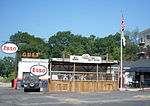McWhorter Stadium
2020 establishments in South CarolinaClemson Tigers softballClemson Tigers sports venuesCollege softball venues in the United StatesSoftball venues in South Carolina ... and 1 more
Sports venues completed in 2020
McWhorter Stadium is a softball park in the southeastern United States, located in Clemson, South Carolina. It is primarily used for NCAA and is the home field of the Clemson Tigers of the Division I Atlantic Coast Conference. The stadium opened in 2020, with the launch of the Tiger softball program, and contains seating for 1,000, additional spectator space on a grass berm, and player development areas.On February 5, 2021, Clemson University announced that Stuart McWhorter and his family had donated $2.5 million to the softball program, and that the stadium would therefore be named in their honor.
Excerpt from the Wikipedia article McWhorter Stadium (License: CC BY-SA 3.0, Authors).McWhorter Stadium
Athletic Service Drive,
Geographical coordinates (GPS) Address Nearby Places Show on map
Geographical coordinates (GPS)
| Latitude | Longitude |
|---|---|
| N 34.677568 ° | E -82.849033 ° |
Address
P-4
Athletic Service Drive
29634
South Carolina, United States
Open on Google Maps








